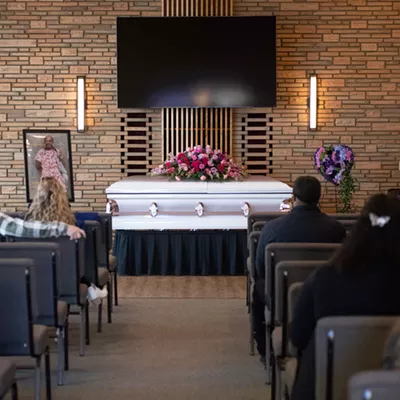Thursday, December 14, 2017
Why Spokane's HR director, for decades, didn't talk about own sexual harassment story

This week our cover story features local woman sharing their reactions to the #MeToo movement, an outpouring of sexual harassment allegations against powerful men. In our news section, we also dive into the effort to rewrite the city's sexual harassment policy.
Chris Cavanaugh, elevated as the human resources director in the wake of a scandal involving harassment allegations against the former police chief, has played a crucial role in not only shifting the city's policy, but altering how the human resources department operates.
But even for her, there are some stories about sexual harassment she rarely talks about.
"It was many, many, many years ago," Cavanaugh says.
Decades earlier, she'd been a college student at Washington State University, working in a work-study job.
“Someone came up behind me at a copy machine, reached around and grabbed my breasts,” Cavanaugh says. “I turned around and looked at the person and burst into tears and left. Left the job entirely.”
She never reported to human resources. Until she told the Inlander, she hadn’t even told her husband or her kids.
Generally, it wasn't something she talked about, even with people close to her. The assault felt like a crass violation of who she was and how she wanted to be seen.
"For me, I see myself as a successful, strong women," Cavanaugh says. "To think, that there was a situation where I was physically touched?... That is not how I like to define myself."
She told the Inlander she planned to tell her husband and her children before this article was published.
These sorts of stories are common for people who work in HR, she explains.
"There’s a reason a lot of us end up in human resources," Cavanaugh says. "Wanting to make sure that what happened to us doesn’t happen to someone else. "
In her case, however, it wasn't her experience with sexual harassment that pushed her into the profession. It was another awful turn of events.
"My son had cancer and I was cut loose from a job for spending too much time in the hospital," Cavanaugh says. "Nobody should have to choose between having to be at the hospital with their son and work."
Yet she says her experience with sexual harassment has given her a sense of empathy when speaking with employees bringing forward harassment complaints.
"I've been investigating complaints since 1992ish at Spokane County," Cavanaugh says. "When people started talking to me to bring me complaints, I was like: 'Been there. I know how you feel.'"
During sexual harassment training sessions, she would even bring up the example of what happened to her at WSU as an example, but without saying it had happened to her.
She says she understands how difficult it is to speak up about sexual harassment, and why so many people don't want to report it or cooperate with an investigation.
"The first thing almost any person who comes to me to complain about sexual harassment says is, ‘I don’t want anyone to know,’” Cavanaugh says. “It’s embarrassing. They don’t want their loved ones to hear about it. They don’t want their co-workers to look at them and say, 'Oh, wow.'"
When former police department spokeswoman Monique Cotton accused then-Police Chief Frank Straub of sexual harassment, Cotton didn't want there to be a formal investigation. Cavanaugh is sympathetic to these sorts of concerns.
"As an investigator, sometimes I just want to say, 'Okay, we won't look into it,'" Cavanaugh says. But, at least under the new policy, HR doesn't have the option to not investigate. And she thinks that's a good thing.
“It's not about sex, it's about power. If that person was abusing power with one individual, they’re [potentially] abusing it with others," Cavanaugh says. "It is our responsibility to hear that person, make them as comfortable as possible, but let them know, right from the get-go... . We must look into it. Period."
For Cavanaugh, the explosion of personal stories and conversations that has come out of the #MeToo movement has been encouraging.
"This is the first time I hear people talking about it, and that's comforting," she says.
Before she ever got into HR, Cavanaugh says, she would hear people dismiss allegations because the woman wasn't considered attractive enough.
"I don't hear that as much anymore," she says. "I hope that's because people are starting to figure out that it's not about [sex] it's about, 'How can I abuse my power?'"
But Cavanaugh hopes that even if the amount of media coverage about sexual harassment and sexual assault declines, the focus on the issue at the City of Spokane would persist.
"I would like to see the focus on training and engaging our employees continue past the time that we're reading about it a lot in the press. I would like to have this be a long-term focus," Cavanaugh says. "A lot of times, as soon as there are budget cuts, training is one of the first things that goes."
Tags: Chris Cavanaugh , human resources , Monique Cotton , Frank Straub , City of Spokane , News , Image



















